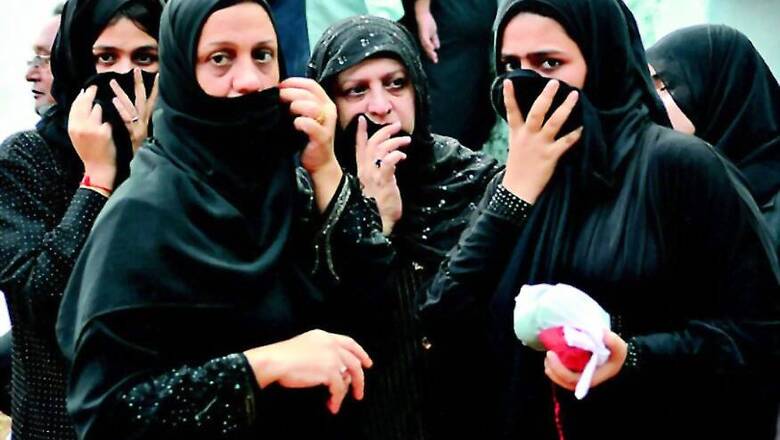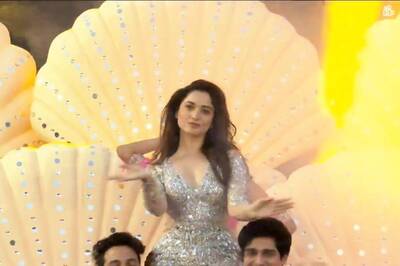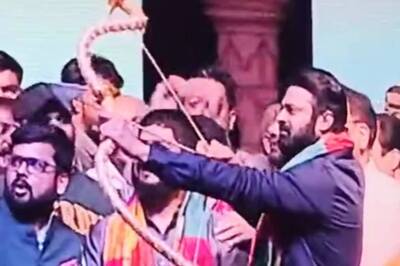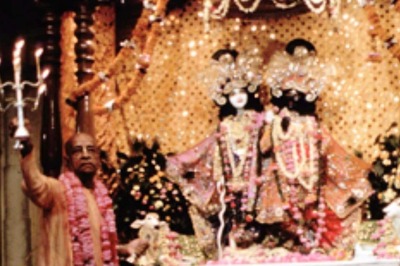
views
New Delhi: Even as it stated that reforms are not for the courts to bring, the Supreme Court on Friday questioned how can practices like triple talaq be validated by man-made laws when Muslim scholars themselves dub the practice as ‘sinful’ in the eyes of the God.
On the second day of the hearing on triple talaq, the Chief Justice’s court not only reverberated with the verses of the Quran from Surah An Nisa, Surah Al Baqarah to Surah At Talaq, but also had Arif Mohammad Khan equating the practice of instant talaq to “burying a woman alive” with a sudden intervention by an aggrieved woman who called triple talaq to be “a result of the bogus supremacy of Darul Qazas and clergymen.”
The five judge bench hearing challenges to the practice of instant divorce in Islam on Friday witnessed the last round of submissions by the petitioners.
One thing was clear on Friday — the bench was keen to know what different schools of thought in Islam held about triple talaq. Justice Rohinton Fali Nariman questioned as to what did Imam Abu Hanifa (founder of the Hanafi school of Islam) thought about triple talaq.
“Nobody has till now quoted what Abu Hanifa had to say about Triple Talaq since 90% of Indian Sunni Muslims were Hanafis. We know the scholars who have relied on him, but we want to know whether he considered triple talaq to be a valid form of divorce or not? I don’t want to know what the British judges had to say about this,” said Justice Nariman while replying to a counsel for the respondent, Nithya Ramakrishnan, when she spoke to justify how Talaq-e-Sunnat was the authentic form of Islamic divorce and Talaq-e-Biddat (Triple Talaq) was nothing but a later innovation.
“Imam Abu Hanifa was a very pious soul. He only has 4 pages accredited to him. He hated to obey a wayward government and for this he was imprisoned and beaten for 11 days after which he expired. He left no documented evidence of his sayings or belief. It’s only his disciples Imam Youssef and Imam Mohd who wrote about him. There are no schools of thought in Islam and these schools were only invented not for the need of the religion but for the need of the empire,” said Khan.
Khan also cited observations by former Chief Justice of the Supreme Court of Pakistan, Justice Javed Iqbal and said that if anything has to be decided it has to be by the Quran and the holy book is silent, it is only then we look into the prophetic traditions.
Arif Mohammad Khan further stated that a book by AIMPLB on Muslim Personal Law says that even if a divorce is given in jest or when someone is not in senses, even then it is valid. He termed it “ridiculous” and a “distortion of Islam”.
The day began with Salman Khurshid making his amicus curiae submissions where he laid what exactly the process of talaq was and how an interval of three months needs to be maintained between the two revocable divorces and only after the passage of the first two periods of three months that the third ‘irrevocable talaq’ can be pronounced.
On Nikah Halala, Khurshid stated that after the pronouncement of the ‘irrevocable talaq’, the man is not permitted to take the wife back without her having married and divorced some other man.
“It was only there so that there is no parody of talaq among the Muslim,” said the amicus curiae.
However, in a later submission, Arif Mohammad Khan disagreed with Khurshid and said, “There is no concept of Nikah Halala in Islam and there was punishment in the nature of keeping someone with an adulterer if they committed such a crime. The husband and wife can enter into a fresh Nikah after the irrevocable talaq has been pronounced and the period of iddat has also passed, which is like a cooling-off period apart from determining paternity.”
The Chief Justice had also posed a question to which there were no answers from any of the counsels. “Have customs or usage been made subservient to Muslim Personal Law in the 1937 Shariat Application Act or not? Tell us whether Triple Talaq is custom/usage or fundamental to Islam? Where does it lie, Shariat or customs and usage?” asked the CJI.
The amicus curiae also said that “it’s being reported and people feel that your lordship will transform Islam and reform Islamic law, but your Lordships are actually looking at whether Triple Talaq has any validity under Islam. What is being made a problem actually has its solution in Islam.”
To this, Justice Kurian Joseph, said, “You want us to reinstate what ‘pristine form of Islam’ talks about?” Khurshid answered in the affirmative.
After a pause, Khurshid said that the bench needed to decide whether triple talaq was abhorrent or not. To this, the CJI said, “Mr Khurshid, now you are moving in circles (laughs).”
At this juncture, Kapil Sibal intervened and said, “How can Islam have practices which are antithetical to the very concept of Islam?”
Justice Nariman also told the amicus curiae that, “Article 25 of the Constitution says that you need to view religion from the point of view of religion only and not your views.”
Friday’s hearing also witnessed submissions made by the octogenarian senior advocate, Ram Jethmalani, who made submissions on behalf of a triple talaq victim and called the act of unilateral divorce a domain exclusively for men and thereby a violation of Article 14, 15 and 21 of the Constitution.
However, CJI Khehar was far from being convinced and said, “Khurshid told us about delegatory divorce (Talaq e Tafweez) and in that case there will be no discrimination.”
But Jethmalani retorted saying discrimination is very much there. “There cannot be bias against a woman just because she is a woman,” said Jethmalani who further quoted Article 13, 14, 15 and 21 of the Constitution and bias on the basis of sex.
CJI Khehar made it clear that the court was not dealing with a state law but personal law in this case and hence did not attract Article 13 in particular.
However, Jethmalani said any law enforceable by a court is law and has to be tested whether it infringes constitutional rights or not. The CJI at the end said that the bench cannot agree with Jethmalani as there was no one who said talaq is custom or usage.
Arif Mohammad Khan, who occasionally quoted Arabic verses and translated them in front of the bench, explained the process of talaq according to the Quran and how any other secondary source need not be looked at.
“The Quran advises the husband to settle the differences through a mutual conversation as the first step. This step is known as the Fa’izu Hunna, then there is a step of physical separation, known as the Wahjuru Hunna, and if that fails then husband must attempt to talk to the wife, make peace with her and talk about the gravity of the situation. This third step is known as the Wazribu Hunna. If the third step fails, the fourth step of ‘arbitration’ must be followed. In this step, there is arbitration by members from the family of both the parties. It is only after all these four steps have failed that a husband pronounces the first talaq. The husband has to compulsorily wait for a wife's iddah to complete before pronouncing another talaq,” said Khan.
The drama notched up when the court allowed an aggrieved petitioner, Farah Faiz, to present her case, thought the CJI was unrelenting in the beginning.
“Maybe you are hurt but we are not looking into facts but only on pure proposition of law,” noted CJI Khehar.
However, when allowed, Faiz blamed the Maulanas and Qazis for discouraging woman from approaching courts to seek judicial remedy and said, “They always try to force us to visit the Darul Qazas or Qazi Courts stating that if we don’t then we will become Kafirs (non-Muslims). This is the bogus supremacy of these scholars that we are being made a victim of.”
She further stated that it was only the Quran that should be relied upon by Muslims and dismissed the notion of various sects. “We must realise that these Darul Qazas are running their own high courts and supreme court,” she said.



















Comments
0 comment